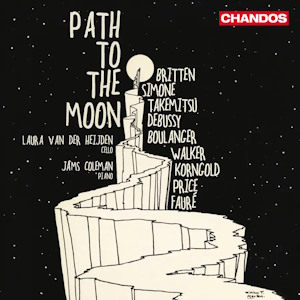
Path to the Moon
Laura van der Heijden (cello)
Jâms Coleman (piano)
rec. 2023, Potton Hall, UK
Chandos CHAN20274 [78]
The title of this album is suitably quirky. ‘Path to the Moon’ is a drawing by the English artist William Horton published in ‘A Book of Images’ in 1898, a strikingly symbolist image that drew praise from W.B. Yeats. It offers a neat peg for a wildly unfocused programme but perhaps it’s the kind of programme that works because of its sheer oddity. It’s surely the first disc to feature Takemitsu, Britten and Jonathan King.
There are three major sonatas, those of Britten, Debussy and the long-lived American George Walker whose 1957 Cello Sonata, cast in three conventional movements, makes a good impression in this performance by Laura van der Heijden and Jâms Coleman. Well-structured and moody – variously urgent, glowering, angular and terse – and pulsing with ostinato, and uneasy oscillations between mood and texture, it covers essential ground. Canonic in places in the central movement it can be very withdrawn but Walker is fully in command of his material and in the finale unleashes some jazz elements, freed from constraint, in a fitting summation.
If Walker’s sonata is little-known, Britten’s is best remembered from his recording with Rostropovich, which this one closely resembles in matters of structure if not in qualities of tone. Van der Heijden and Coleman catch the twilit and ruminative qualities adeptly without seeking to emulate the bigger gestures of composer-executant and his cellist though her tone is at its leanest and most intense in the Elegia, the heart of the work, where Coleman’s colouristic responses too are at their apex. Modern day recordings of Debussy’s Cello Sonata are invariably too slow for me, too unwilling to embrace the disconcerting rapidity of his expressive changes. This is invariably the case in the first movement and something I feel about this performance, no matter how eloquent it may be otherwise. The sense of fantasy is inevitably muted.
Many of the songs that satellite around these three sonatas are heard in arrangements or transcriptions. Korngold’s Duet offers a gentle start and the Lili Boulanger Reflets continues the mood of intimacy. Florence Price’s Night has been arranged by Tom Poster and is based on a poem by Louise Wallace. The cello line faithfully follows the vocal in the single example from Britten’s Michelangelo Sonnets. Debussy is represented by two songs in this Francophile-leaning element of the programme; Beau soir and the deft envoi afforded by Clair de lune. Fauré provides his own lunar contribution which fits the programming conceit well with its rather more athletic profile. Takemitsu’s Will Tomorrow, I Wonder, Be Cloudy or Clear? is, remarkably enough, a cabaret cum pop song and Jonathan King’s Everyone’s Gone to the Moon is a delicious pop song from 1965 though the cello arrangement is based on Nina Simone’s version from 1969. Poor King has had his name supplanted in the track listing by hers which strikes me as unfair.
This is a pleasantly varied – very varied – programme. At a time when chamber players are accused of a lack of creativity in their programming here’s one that shows that songs are fruitful ground for transcription and the nexus between voice and cello offers particularly useful material. Potton Hall offers its own clear sound and Jonathan Cooper’s engineering is just as fine. The two performers provide the imaginative programme notes. If you want to fly to the moon or merely wish to bathe in its luminosity here’s your chance.
Jonathan Woolf
Help us financially by purchasing from



Contents
Erich Wolfgang Korngold (1897-1957)
Schönste Nacht, Op.36 No.25 (1946)
George Walker (1922-2018)
Cello Sonata (1957)
Lili Boulanger (1893-1918)
Reflets (1911) arr. cello and piano
Florence Price (1887-1953)
Night (1946) arr. cello and piano by Tom Poster
Benjamin Britten (1913-1976)
Seven Sonnets of Michelangelo: Sonetto XXX (1940) arr. cello and piano
Sonata, Op.65 (1960-61)
Claude Debussy (1862-1918)
Beau soir, L6 (c1880 rev 1890-91) arr. cello and piano by Alexander Grechaninov (1920s?)
Gabriel Fauré (1845-1924)
Clair de lune, Op.46 No.2 (1887) arr. cello and piano
Claude Debussy (1862-1918)
Cello Sonata, L135 (1915)
Toru Takemitsu (1930-1996)
Will Tomorrow, I Wonder, Be Cloudy or Clear? (c.1992) arr. voice Henning Brauel, arr. cello and piano
Jonathan King (b.1944)
Everyone’s Gone to the Moon (1965) vocal by Nine Simone (1969) arr. cello and piano
Claude Debussy (1862-1918)
Suite Bergamasques; No.3, Clair de lune (c 1880 rev 1905) cello arr. Ferdinando Ronchini, piano arr. Alexandre Roelens

















